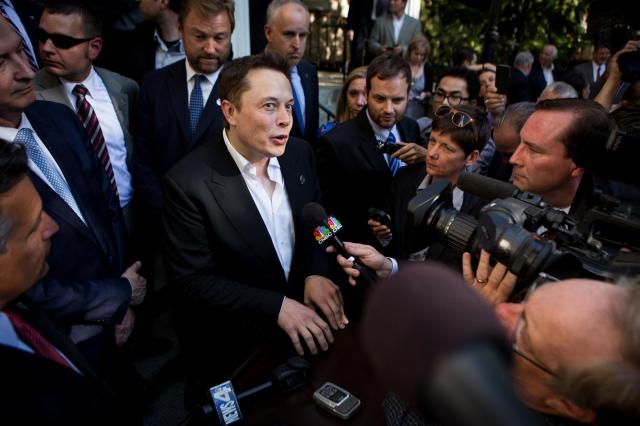Elon Musk in Nevada after announcing his plan to build a Tesla Gigafactor in the State. Credit: Max Whittaker/Getty Images

Amazon’s Jeff Bezos is the richest man on the planet – and he’s out with a begging bowl.
Bezos has asked 238 North American cities if they could help out funding his next big Amazon office. Specifically, he asked for help to “offset its costs for building and operating its second headquarters.”
Meanwhile, as my colleague James Bloodworth makes depressingly clear in a new audio documentary for UnHerd, Amazon is engaging in exploitative workforce practices – not fussed about employee welfare, but aggressive in pursuing ‘corporate welfare’.
Demands for subsidies and sweeteners are not new, American companies have become adept at squeezing the public purse. In 2013, for example, Boeing gouged a historic $8.7 billion out of the state of Washington just by threatening to move. [1. Lydia DePillis, ‘The state’s tax deal with the company now runs to the year 2040’, CNN Money, 13 February 2018]
This is how it works: corporations come to town saying they need to build a big new plant. For local economies that means jobs, often much needed jobs. And once those jobs have been dangled in front of local politicians, the company asks for a nice tax break – otherwise they will go elsewhere. Even worse, these demands are occurring at a time when states and cities are in the throes of a potentially disastrous revenue crisis.
Amazon’s high-profile ‘HQ2’ circus, scouring the nation for a second huge headquarters office base, is an egregious case in point. Bezos’ public bidding (begging) process “has garnered the kind of enthusiasm normally reserved for bids to host the Olympics.”
They say they’re after a location with local tech talent and a pleasant environment, but the real reason for the circus is the bottom line. HQ2 is a bidding war. The most eye-popping of those offers was New Jersey’s at $7 billion in tax incentives.
As Harvard’s Ed Glaeser drily remarks: “At its best, the competition for Amazon has spurred cities to think about how to improve their quality of life more generally,” he said. “At its worst, the competition has become a distraction and a contest for throwing cash at the giant.” [2. Nick Wingfield, ‘Amazon Chooses 20 Finalists for Second Headquarters’, New York Times, 18 January 2018]
The problems inherent in tax-cut bidding wars have recently been illustrated by the efforts of another mega-company, Tesla, and its Nevada battery “Gigafactory.”
Like Jeff Bezos, Elon Musk is a billionaire with fingers in a lot of pies – not only Tesla, but the Boring Company (digging tunnels), SpaceX (rockets), and Solar City (huge batteries). Musk has proved adept at taking government money over many years – one report calculated his car company alone had pocketed $3.5 billion in subsidies and tax breaks, another that the grand total is nearer $5 billion.
And this isn’t just a problem for the United States. Amazon’s vast distribution centre in Swansea was built by the British taxpayer to the tune of £4.9 million – on top of an £8.8 million sweetener to get the company interested in locating in Wales.
The non-profit group Good Jobs First has been tracking the efforts by tech giants to get local governments to pay up, and the remarkable willingness shown by politicians to give away future tax revenues – or even shell out cash. While these deals may have economic merit, it’s hard to tell since politicians interested in short-term acclaim are trading it for long-term costs that their successors will have to bear.
Musk’s latest effort is attracting particular scrutiny. Located in Nevada, the Gigafactory is not just the world’s largest factory, it’s claimed to be the world’s largest building. According to a report on The Verge, having narrowed its search to four states the company initially asked Nevada for $500 million up front, in cash. Nevada baulked, but in the end agreed $1.3 billion in tax breaks spread over the next 20 years.
One economist reckons that will amount to a cost of nearly $200,000 per new job – assuming everything goes according to plan. Of course, if it does not, and the company’s plans end in bankruptcy, there will be nothing for the state to claw back.
As a recent report in The Guardian notes, there’s already evidence of a downside for locals. In a town called Sparks, 20 miles away from the factory, rents and house prices are rising – and forcing out poorer locals. The tax breaks also mean there is little in the way of funds to help local communities handle the influx of new people. While the state claims to help out, according to Sparks’ city manager “despite surging population growth and increased strain on police and fire departments and schools” his budget is flat.
While governments all over the world cut deals to encourage development in poorer areas, that’s not the same thing as having vastly wealthy companies double dipping into the public purse.
It’s plain that corporate welfare deals like these require long-term impact assessments that take into account public welfare issues – from Seattle’s spiralling house prices and homelessness, to the needs of the schools and police and fire services in Sparks. And these assessments need to be the subject of press scrutiny and public debate before decisions are made.
Cities and states – and their citizens – need to wise up.










Join the discussion
Join like minded readers that support our journalism by becoming a paid subscriber
To join the discussion in the comments, become a paid subscriber.
Join like minded readers that support our journalism, read unlimited articles and enjoy other subscriber-only benefits.
Subscribe